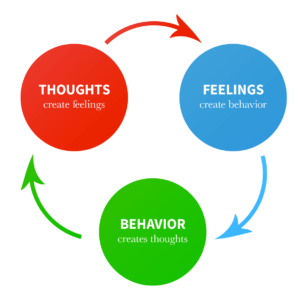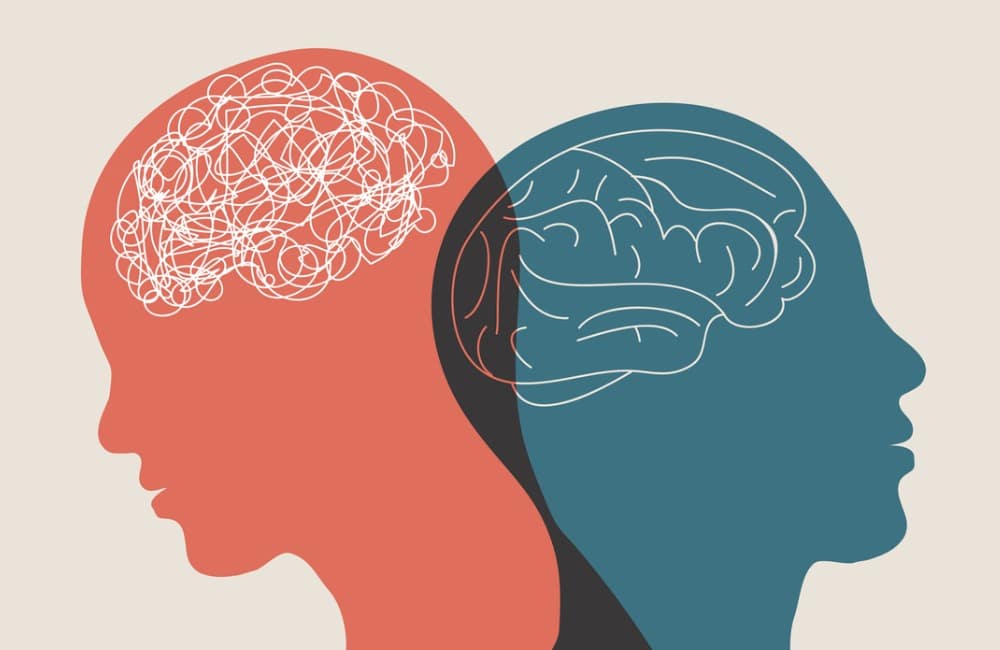Cognitive behavioral therapy (CBT) is a type of psychotherapy that has been shown to be effective in the treatment of opioid use disorder. In this blog post, we will discuss what CBT is, how it works, and some of the benefits associated with its use.
Contents
What Is CBT?
 CBT is a form of psychotherapy that focuses on the connection between thoughts, feelings, and behaviors. It examines how these three elements interact to shape the individual’s response to their environment. CBT helps people become aware of their negative patterns of thinking and behaving, as well as learn more effective ways of dealing with their problems.
CBT is a form of psychotherapy that focuses on the connection between thoughts, feelings, and behaviors. It examines how these three elements interact to shape the individual’s response to their environment. CBT helps people become aware of their negative patterns of thinking and behaving, as well as learn more effective ways of dealing with their problems.
Opioid use disorders are highly complex and challenging for individuals to manage due to the intense cravings experienced when withdrawing from the drug. CBT can help individuals better cope with the symptoms of withdrawal and reduce their risk for relapse.
So, if you want long-term success with managing opioid use disorder, CBT should be part of your treatment plan. It can help you learn healthier coping skills for the physical and psychological symptoms of withdrawal. As well as reduce cravings and provide structure to help you stay on track.
How Does CBT For Opioid Use Disorder Work?
The process is quite straightforward. In short, CBT for opioid use disorder works by helping the patient to identify and change problematic patterns of thoughts and behavior related to his or her addiction. The therapist is also able to offer guidance on how to cope with difficult situations or triggers that may lead the person back into substance abuse.
During the session, the therapist will work with the patient to identify situations and behavior that are associated with their opioid use. Such as feeling anxious or stressed out. The therapist may also help the client understand any underlying issues that could be contributing to their substance abuse.
Once these issues are identified, the therapist can help the client develop healthier ways of managing them instead of relying on opioids. This may include learning new coping skills and problem-solving strategies. As well as developing alternative activities to replace substance abuse.
It is simply the best way to help someone recovering from opioid use disorder. The goals and objectives may differ, depending on the individual’s needs. But ultimately, CBT aims to help people identify patterns of behavior and develop healthier ways. In order to cope with life’s stressors and triggers.
What Techniques Are Used In CBT For Opioid Use Disorder?
 We now know the process, but knowing the proper techniques and interventions of CBT for opioid use disorder is just as important.
We now know the process, but knowing the proper techniques and interventions of CBT for opioid use disorder is just as important.
Here are the common techniques that you should be aware of:
1. Psychoeducation: This is a process that helps individuals understand their condition and how to better manage it. It can involve helping someone become more aware of their triggers and cravings. As well as providing them with the tools to cope with difficult emotions or situations without resorting to opioid use.
2. Cognitive Restructuring: This is a process of changing how an individual looks at certain situations. By examining the thoughts and beliefs that can trigger negative feelings and behaviors, individuals learn to reframe their thinking in order to create more positive outcomes.
3. Motivational Interviewing: It involves helping individuals identify their own motivation for change and creating a plan for how to reach these goals. Depending on the individual, a therapist may use this approach in order to develop positive coping strategies.
4. Stress Management: This is an important element of recovery from opioid use disorder, as stress can be a major trigger for relapse. Techniques such as relaxation, mindfulness, and exercise can help individuals better manage their stress levels. And cultivate healthier coping strategies.
5. Contingency Management: Finally, it is a form of reinforcement that rewards positive behaviors or abstinence from use. By providing incentives for reaching certain milestones or goals, an individual may be more likely to stay on track with their recovery.
By understanding the process and techniques used in CBT for opioid use disorder, people can get the help they need. Although this is not an exhaustive list of CBT techniques, it provides an overview of the common approaches used in recovery.
What Are The Pros And Cons?
If you are considering CBT for Opioid use disorder treatment, then you can expect the following pros and cons:
Pros
- It is a non-medication-based treatment, so there is no risk of dependence and abuse.
- CBT can help you to gain control over your addiction by teaching you how to recognize triggers and effectively manage cravings for opioids.
- It also helps individuals develop better problem-solving skills and coping strategies.
- It is a collaborative approach to treatment that encourages active participation from the patient and helps create an atmosphere of trust and support.
Cons
- CBT requires commitment and dedication from both the clinician and the patient.
- Results may not be visible immediately, so some patience is required in order for it to be effective.
- It may be difficult to find a qualified therapist who specializes in CBT for opioid use disorder treatment.
- The cost of therapy can be expensive, so it may not be an option for everyone.
Overall, Cognitive Behavioral Therapy offers many potential benefits as a form of treatment for opioid use disorder. But there are also some drawbacks to consider. It is important to discuss all of your options with your doctor and therapist before deciding if this type of treatment is right for you. With the proper guidance and support, it can be an effective way to manage opioid addiction and help individuals lead healthier lives.
How Can I Self-Manage Opioid Use Disorder?
 Self-managing opioid use disorder can be a difficult and challenging process. However, there are a few strategies that may help you manage your condition more effectively. These include:
Self-managing opioid use disorder can be a difficult and challenging process. However, there are a few strategies that may help you manage your condition more effectively. These include:
1. Connecting with a support system – Whether it be friends, family, or other individuals in recovery, having a strong support system can make the journey to recovery much easier. Having an understanding and supportive group of people who you can turn to during difficult times is essential for self-managing opioid use disorder.
2. Setting realistic goals – Setting small, achievable goals is a great way to stay on track with managing your opioid use disorder. Make sure you include both short and long-term goals in your plan. So that you stay focused and motivated throughout the process.
3. Establishing healthy coping strategies – Finding effective ways to cope with stress or triggers can help you stay on track with your goals. Some healthy coping strategies include mindfulness meditation, yoga, exercising, and talking to a therapist.
4. Avoiding triggers – Knowing what triggers an urge to use opioids is essential for self-managing opioid use disorder. Avoiding these triggers can be difficult at times but it’s important to stay away as much as possible in order to remain sober.
5. Staying active – Exercise and physical activity can help reduce stress and provide an outlet for any negative emotions you may be feeling. Aim to incorporate exercise into your daily routine, such as going for a walk or taking a yoga class.
Following these strategies can help you manage your opioid use disorder more effectively and remain sober. Remember to be patient with yourself and take it one day at a time. Recovery is possible if you have the right support system and coping strategies in place.
Conclusion
To conclude, CBT for opioid use disorder is widely been used as an effective treatment for opioid addiction. And is gaining more recognition in the world of addiction medicine. With the help of CBT, individuals are able to reshape their thought patterns and behaviors which can lead to long-term recovery. It is important to remember that it is a process that requires dedication and commitment from both the patient and their healthcare team.
For more information, please contact MantraCare. Abuse is a serious and harmful behavior that can cause physical, emotional, or psychological harm to a person. If you have any queries regarding Online Counseling experienced therapists at MantraCare can help: Book a trial Online therapy session


